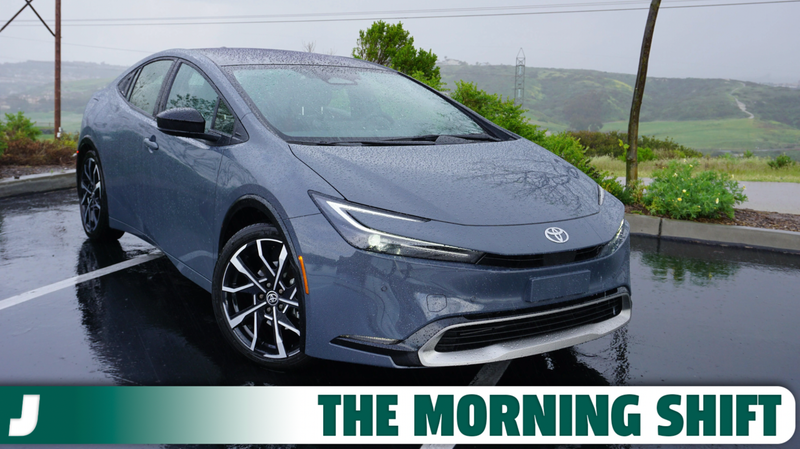Ditching EVs For Hybrids Is Already Paying Off For Automakers

Good morning! It’s Thursday, September 5, 2024, and this is The Morning Shift, your daily roundup of the top automotive headlines from around the world, in one place. Here are the important stories you need to know.
1st Gear: Automakers See Sales Boost With Hybrids
Hybrids have pulled Toyota out of a two-month rut and are helping Hyundai and Kia post record sales numbers for August. That’s not too shabby for a vehicle type that is quickly being seen as a really strong compromise between regular internal combustion-powered vehicles and all-electric cars.
Honda also saw sales rise in August thanks, in part, to thehybrids up and down its lineup. Sales of the brand were up 28 percent for Honda, but they were down for the eighth straight month over at Acura. From Automotive News:
Toyota said its August sales of electrified models rose 49 percent to 94,509, or almost half – 48 percent – of its U.S. deliveries during the month, nearly all of them gasoline-electric hybrids.
Hyundai said deliveries jumped 22 percent to 79,278 last month while Kia volume rose 4.3 percent to 75,217.
It was the second consecutive monthly gain for Hyundai. Hybrid models posted an increase of 81 percent last month, Hyundai said, led by two core crossovers, the Santa Fe, up 120 percent, and Tuscon, up 97 percent. Fleet represented 7 percent of August volume, or about 5,550, the company said.
Kia said its crossover deliveries jumped 9 percent, while EV sales rose 27 percent, driven by the new EV9 three-row crossover, and plug-in hybrid volume increased 43 percent, with overall deliveries of electrified vehicles advancing 9 percent.[...]U.S. auto sales are projected to rise 7 to 8 percent last month, based on estimates from Cox Automotive, S&P Global Mobility and J.D. Power/GlobalData. Average transaction prices are falling as inventory rises and incentives increase. August also had 28 selling days, one more than August 2023, and five weekends, including Labor Day weekend, traditionally a key period for promotions and sales.
Hybrids are also sort of hurting EVs, aided by competitive pricing that is cannibalizing EV sales. Battery-powered cars and light trucks will account for just nine percent of industry deliveries in the U.S. this year. That’s down from the previous forecast of 12.4 percent.
These types of cars are just in very high demand right now. Auto News says some Toyota dealers tell them that customers are waiting two or three months just to take delivery of a new hybrid.
I still think that eventually EVs will take over, but customers and infrastructure just aren’t there yet. Until then, hybrids are a fantastic middle ground.
2nd Gear: BMW’s Hydrogen Car Is A Few Years Away
At this point, hydrogen-powered consumer vehicles seem like an all-but-dead idea, but that isn’t going to stop BMW from giving it a go. The German automaker is planning to sell hydrogen-powered vehicles in just four years time in an effort to establish the tech as an alternative to battery-electric vehicles.
BMW isn’t doing this alone, though. The company is teaming up with Toyota (which has been making hydrogen-powered cars for a long time now) to get the tech off the ground. Production is slated to start in 2028 with hydrogen variants of existing BMW models available that year. From Bloomberg:
While BMW has for years pursued the technology, cars with a fuel cell are struggling to take off because of high costs and a lack of fueling infrastructure. There’s also very little choice, with Toyota’s Mirai and Hyundai Motor Co.’s Nexo among the few models available. Global sales of hydrogen cars declined to just 9,000 units last year, according to BloombergNEF.
Proponents of fuel cells point to long driving ranges and argue the technology can prove effective in regions where battery-charging infrastructure isn’t strong enough to support a transition to EVs. They burn hydrogen to produce electricity and emit only water.
BMW and Toyota plan to make hydrogen powertrains together for use in models from both carmakers. They expect that joint development and parts procurement will help drive down costs and make the technology more competitive. BMW declined to comment on prices for its future hydrogen cars.
BMW has operated a small test fleet of hydrogen-powered iX5 sport utility vehicles since 2023. Chief Executive Officer Oliver Zipse has previously said that hydrogen drives might be an option for BMW’s “Neue Klasse” line of EVs due to launch next year.
“We are

 Yahoo Autos
Yahoo Autos